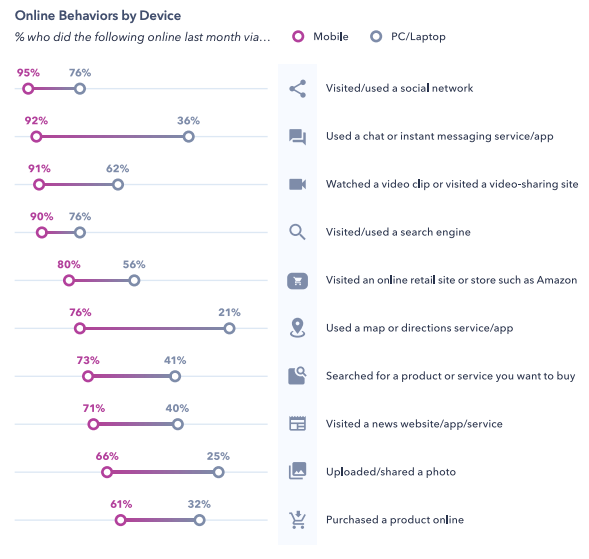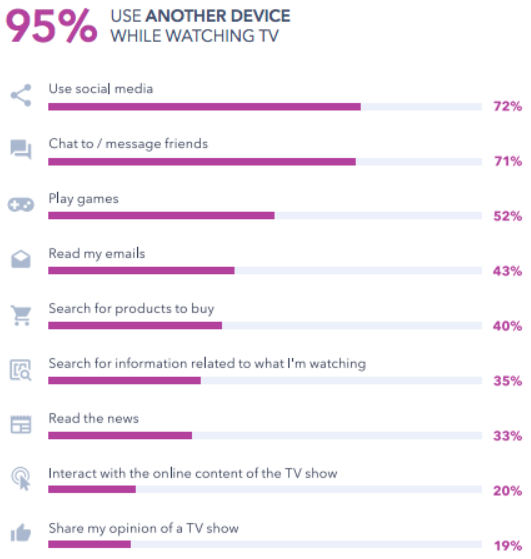You’re in a meeting with your boss when it happens. Your breathing starts to quicken. Goosebumps appear on your arms. A bead of sweat drips down your forehead. You know it’s coming. Your boss is about to ask you how to market to Generation Z.
The mere mention of this group of 2.1 billion individuals born between 1995 and 2010 sends shivers up your spine.
You know Generation Z is a huge group with spending power of over $143 billion in the United States alone. But how do you start marketing to them?
What do they like?
How do they talk?
What actually matters to them?
These are big questions. And the answers will help you do more than just market to Gen Z. They’ll help you create valuable relationships and prepare your business for the future.
Here’s what you need to know if you want to make meaningful connections with the next most important generation on the market.
Everything you need to know about Generation Z
They value individual expression
The phrase ‘be yourself’ has never rung as true as with Gen Z. The act of buying products or services isn’t necessarily about fitting in with trends or ‘what’s cool.’ It’s about expressing individual identity.
“Generation Z is not only eager for more personalized products but also willing to pay a premium for products that highlight their individuality,” research from global consulting firm McKinsey and Company finds. In fact, 58% of those surveyed said they’re willing to pay more for products and services that highlight their individual personalities.
The same research finds that Gen Z wants brands to align with their personal values and beliefs.
They’re protective of their privacy
Gen Zers crave hyper-personal experiences on social media, but they’re also keen to protect their privacy. They’re also more inclined to cover the webcam on their laptops.
Marketers need to make sure they connect with Gen Zers on their own terms so that they don’t come across as creepy or too invasive.
Less than one-third of teens say they are comfortable sharing personal details other than contact information and purchase history, according to IBM’s survey Uniquely Gen Z. But 61% would feel better sharing personal information with brands if they could trust it was being securely stored and protected.
They put their money where their values are
Generation Z isn’t content to simply post about causes they believe in. They’re putting their money where their beliefs are and voting with their dollars.
“This generation often puts aside its differences and rallies around causes that will benefit the greater good,” research by Facebook explains. “Gen Z expects brands to do the same—to live their own values and to offer value. In fact, 68% of Gen Zers expect brands to contribute to society.”
61% of Gen Z also says they’d pay more for products or services that are produced in an ethical and sustainable way.
This isn’t just an empty declaration. “In the past year, 91% of Gen Z experienced one or more emotional or physiological stress-related symptoms,” psychology professor B. Janet Hibbs, PhD, shares with Refinery29, citing an October 2018 report from the American Psychological Association.
Among other things, Gen Z is most concerned about climate change.
Brands are slowly realizing they can no longer get away with lackluster or non-existent environmental and ethical commitments. If brands want to appeal to Gen Z (and the greater good) they need to ensure their ethics align with this progressive generation.
If your business doesn’t know where to start, look at Patagonia, Reformation, or any of the brands featured on conscious consumer site The Good Trade.
They value diversity and equality
Due to the increased level of mobilization made possible by technology, Gen Z doesn’t distinguish between friends they have “in real life” and friends they have on the internet. While this might seem like a parent’s worst nightmare, there’s actually a nice reason for it.
“Gen Zers value online communities because they allow people of different economic circumstances to connect and mobilize around causes and interests,” research from McKinsey finds.
“66% of surveyed Gen Zers believe that communities are created by causes and interests, not by economic backgrounds or educational levels.”
This is number is way bigger than the ones reported by baby boomers, Gen Xers, and even millennials.
When it comes to gender equality, 77% of Gen Z say they feel more positively towards a brand when it promotes equality on social media. 71% said they’d like to see more diversity in advertising.
That doesn’t mean you can just throw a person of color or LGBTQ couple in one of your Instagram posts or Facebook ads. “If a brand advertises diversity but lacks diversity within its own ranks, for example, that contradiction will be noticed,” McKinsey and Company explains.
Seems like lazy marketing and business practices have finally met their match in Gen Z.
They’re smart. Like, really smart.
Generation Z are the essential digital natives. They don’t know a world without the internet, so they know how to use it better than anyone else.
Thanks to this digital-savviness, they’ make highly-informed decisions. According to McKinsey, “they’re more pragmatic and analytical about their decisions than members of previous generations were.”
Before buying anything, Gen Z expects to access and evaluate information, reviews, and their own research.
McKinsey finds that “65% of Gen Zers said they particularly value knowing what is going on around them and being in control. They’re more comfortable absorbing knowledge online than in traditional institutions of learning.”
Marketers need to ensure that information about their company is transparent and readily available online. You’ll also want to make sure that information shines an honest, but positive, light on your business.
Keep tabs on what others are saying about your organization with our guide to social media sentiment analysis.
They trust friends and family over anyone else
You might want to take another look at your influencer budget.
While Morning Consult’s recent Influencer Report found that 52% of Gen Z trusts influencers they follow on social media for advice about products or brands, a whopping 82% trust their friends and family over any other source.
When it comes to the influencers they do trust, male Gen Zers are most likely to follow them on YouTube. Female Gen Zers most often follow influencers on Instagram.
Pro tip: the second most trusted resource for Generation Z is product reviews on Amazon or similar sites. Leverage this knowledge by regularly posting genuine positive reviews from real customers to your social media accounts.
Do NOT write fake reviews or have your employees write faux reviews. These will always catch up with you and the negative fallout from this kind of scandal will irrevocably damage your reputation, not to mention the loss of your customers’ trust.
They prefer mobile
According to Global Web Index’s 2019 report on Gen Z, this age group greatly prefers the on-the-go convenience of their mobile devices over PCs and even laptops.
Whether accessing social networks, chatting, watching videos, or looking at maps, Gen Z is most likely doing it on their mobile devices.

As you can see, this doesn’t mean that they’ve completely abandoned PCs and laptops, just that those are a less popular option overall.
They embrace the second-screen lifestyle
Global Web Index found that 95% of Gen Zers said they were using another device while watching TV, particularly mobiles.

What are they doing, exactly? More than 70% say they’re talking to their friends or social networking. However, only 35% are actually chatting or accessing content related to what their watching. Armed with this information, marketers can look to target Gen Z on multiple platforms and devices at all times.
Read our guide on how to make the most of the second screen social trend.
They use different networks for each stage of their shopping journey
Market research shows that 85% of Generation Z learns about new products on social media.
They are also 59% more likely than older generations to connect with brands on social, too.
Instagram is the most popular app for brand discovery, with 45% of teens using it to find cool new products, followed by Facebook, which comes in at 40%. Before making a purchase, Gen Zers are two times more likely than Millennials to turn to YouTube.
YouTube is also the platform of preference when it comes to shopping recommendations, ranking first among Generation Z with 24%, followed by Instagram at 17% and Facebook at 16%.
Meanwhile, in real brick-and-mortar stores, teens are most likely to turn to Snapchat to document their shopping experiences.
Understanding how teens use social media throughout their shopping process is key to engaging them on the right platforms with the right message.
They’re not afraid to buy things online
While older consumers still have some hesitations about sharing their credit card and personal or financial information online, Gen Z isn’t as phased.
72% of Gen Zers have bought something online in the last month, with 6 out of 10 making purchases on their mobile devices.
What are they buying, you may ask? Global Web Index finds that Gen Z is much more interested in spending money on experiences like concert tickets and other entertainment, technology, and fashion.
They’re (mostly) happy to see you
Generation Z isn’t bothered by branded content. In fact, most of them welcome it.
“Gen Z is happy to have content from their favorite brands appear in their newsfeeds,” Global Web Index shares. “4 in 10 are following brands they like on social media, with 1 in 3 following the brands they are thinking of buying from.”
Before you go blasting your social media content and ads out to everyone, you need to know your audience.
Make sure you’re targeting people who could actually find value in your product or service, and focus on attracting their attention.
Not sure where to start? Check out our guide to social ad targeting for a comprehensive resource on converting your Gen Z audience.
They love Tik Tok
Tik Tok, the short video creation and sharing app, has taken the world by storm. While it was once basically a shared amongst teens, it’s now hit the mainstream.
Late Night show hosts share Tik Tok content on their programs. Instagram meme accounts are dedicated to simply reposting popular Tik Toks. And many social media accounts are gathering content and inspiration from the addictive app.
Based on the way trends and media flow, it’s no wonder that Tik Tok is especially popular with teenagers. More than 41% of Tik Tok users are between 16 and 24 years old. And we bet that 100% of them are cooler than us.
While you never want your brand to have a ‘how do you do, fellow kids?’ moment, there are ways businesses and organizations can authentically use the platform. If your brand voice is more playful or irreverent, Tik Tok could be the perfect place to create and share content.
Collaborate with Tik Tok influencers, post content using a branded hashtag, or participate in one of the countless Tik Tok challenges, as long as it aligns with your brand.
Now that you know these key statistics and facts about Generation Z, you’re equipped to not only reach them with your marketing, but to make a lasting impact.
Remember: you’re not just looking to create valuable relationships with them at this point in their lives, but as they grow and age. You haven’t seen the last of Gen Z.
Connect with Generation Z using Hootsuite. From a single dashboard you can easily manage all your social channels, collect real-time data, and engage with your audience across networks. Try it free today.
Get Started
